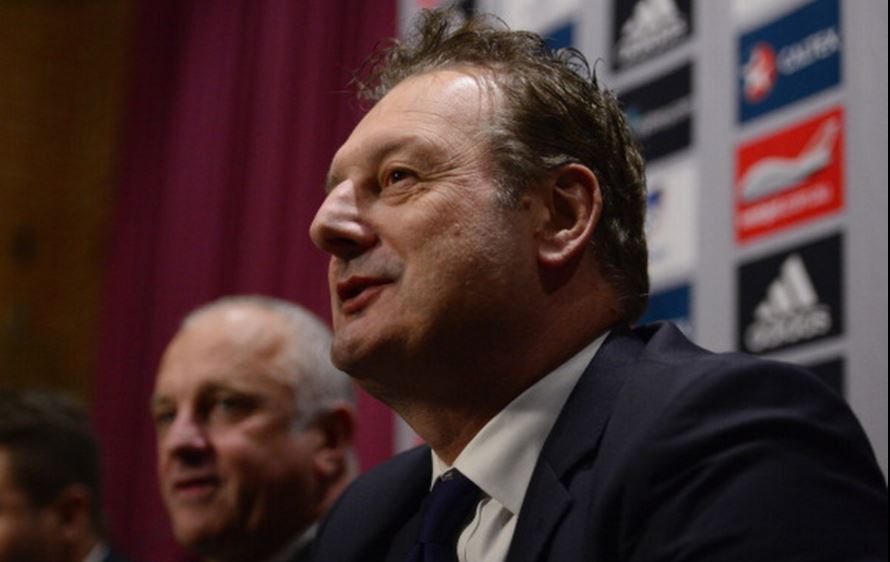A low-key NPL 1 clash between local rivals Dandenong City and Springvale White Eagles at Frank Holohan Soccer Complex may seem like an unusual setting for one of Australian football’s most prominent movers and shakers.
Sydney FC CEO Tony Pignata is on hand to witness City’s comfortable 3-0 home win, with his son Jack currently on the books of the Endeavour Hills based club.
While he’s experienced success interstate and overseas, Melbourne-born Pignata still retains a strong interest in Victorian football, having overseen a massive overhaul of the sport’s governance as CEO of the FFV between 2004 and 2007.
Despite his prolonged absence from governance at the Victorian level, Pignata is excited by the steps the game has taken in his home state over the last few years.
“Football is growing here in Victoria with the implementation of the NPL and the FFA Cup,” Pignata says.
“It’s really brought the game to another level, it’s great seeing more opportunities arising at this level with plenty of kids coming through.
“The onset of the NPL in particular has provided state league clubs the chance to improve their standards and facilities, with it being an enjoyable experience coming down and watching games like this.”
Pignata 50, left the FFA in 2007 to take up a role as Wellington Phoenix’s inaugural CEO, helping build the foundations of early success in the competition with a finals appearance and record crowds, including a sold-out Westpac Stadium against Newcastle during the 2009-10 season.
After a short hiatus from football, he returned to the boardroom as Sydney FC’s CEO in June 2012.
Three years later the businessman has been able to deliver greater stability to the sometimes dysfunctional A-League giant, pivotal in the recruitment of Alessandro Del Piero and the Sky Blues’ recent on-field success under Graham Arnold.
On the A-League front, Pignata believes a number of issues need to be resolved before the competition can expand into new markets.
“First and foremost I believe that a couple of clubs needed to be sorted out before we look into expansion,” he says.
“Structures like the salary cap need to be retained as some clubs are still bleeding, with a lot of losses persistent in the A-League, meaning that the imposition of it maintains control as otherwise salaries would spiral.
“The other benefit of such a system is that it also keeps the league even, making sure each club is careful with its recruitment and selection of visa players.”
Another perceived hurdle facing the Australian game is a lack of promotion and relegation into a professional second division, but Pignata believes such a proposition is still a long-way away.
However, he has earmarked Melbourne’s south east region as a potential candidate for future expansion, with population-base a key factor in his decision.
“Promotion and relegation is a hot topic, and in some regards the FFA Cup has bridged that a little bit, but down the track – who knows in 10, 20 or 30 years time – there could be an opportunity,” he says.
“But it really has to have that big base to do it, as if one team drops down out of the A-League, measures will need to be put in place to ensure clubs are able to survive in any potential second division.”
“A club out this way based in Melbourne’s growing south eastern suburbs is a real possibility in the next five-ten years. It could happen as it’s a region with massive participation levels and if there is another team from Victoria, why not have it out here.”
“While it still is a while away, we need to be looking at growing the A-League into a bigger competition and I know the FFA model is to build clubs where there are a lot of people, not just a few hundred thousand people, so an opportunity could exist for this region in the near future.”
“Having said that, it’s still a long way away as the FFA want to establish the 10 clubs there now and stabilise them before looking into expansion.”
At the moment, Pignata is gearing himself up for another A-League campaign, with Graham Arnold’s men once more tipped to challenge for the title following a Grand Final defeat to rivals Melbourne Victory last season.
Marquee Marc Janko, Serbian defender Nikola Petkovic and talented youngsters Bernie Ibini and Terry Antonis are notable departures, replaced by the unheralded Slovak Filip Holosko as marquee, ex-Serbia international Milos Ninkovic, former Mariner Matt Simon and a host of promising youngsters headlined by Andrew Hoole.
“We’re still hurting from that Grand Final disappointment as we had a great season where we hadn’t lost a game away from home all season up until that day, with the boys determined to make amends [this season],” he says.
“Our roster is settled now and with eight weeks to go we’ll prepare ourselves with a few pre-season games, as well as the FFA Cup clash with Adelaide. Before you know it, it’s October 10 and we’re kicking off our season against Melbourne City in Sydney.”
While many see the on-field signings as the key mechanisms of any successful side, in a salary-capped league the performance of a club’s backroom staff is particularly vital in ensuring results on and off the pitch.
As one of the key figures in the A-League, Tony Pignata continues to combine his business nous with a desire to see football succeed in Australia.

